The world waits: Jury set to deliberate in George Floyd trial after lawyers gave final comments
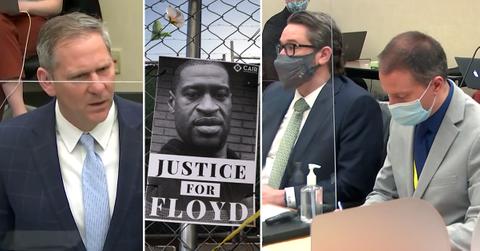
The world now waits.
After 14 days of intense and emotional testimony from experts, law enforcement officer and eyewitnesses, a jury will soon decide the case of Derek Chauvin.
On April 19, both the prosecution and defense teams gave their closing arguments in the trial over George Floyd’s death that has gripped the nation.
Chauvin was charged with second-degree murder, third-degree murder and second-degree manslaughter in connection to Floyd’s death.
On May 25, 2020, an employee of Cups Foods, a grocery store in the Powderhorn Park neighborhood in Minneapolis, reported a drunk customer who had allegedly passed a $20 counterfeit bill to purchase cigarettes.
Floyd was in a nearby vehicle when officers arrived. The police pulled him out of the vehicle and handcuffed him after a brief resistance to show his hands. They took Floyd to a police SUV, where they tried to put him inside, but Floyd resisted.
The officers then took him to the ground. Chauvin, a 19-year veteran and white police officer, kept the 46-year-old on the ground with his knee crouched directly behind his neck. Floyd was pinned to the ground as he yelled, “I can’t breathe,” intermittently as the world watched in for about 8 minutes of the video recorded by eyewitnesses.
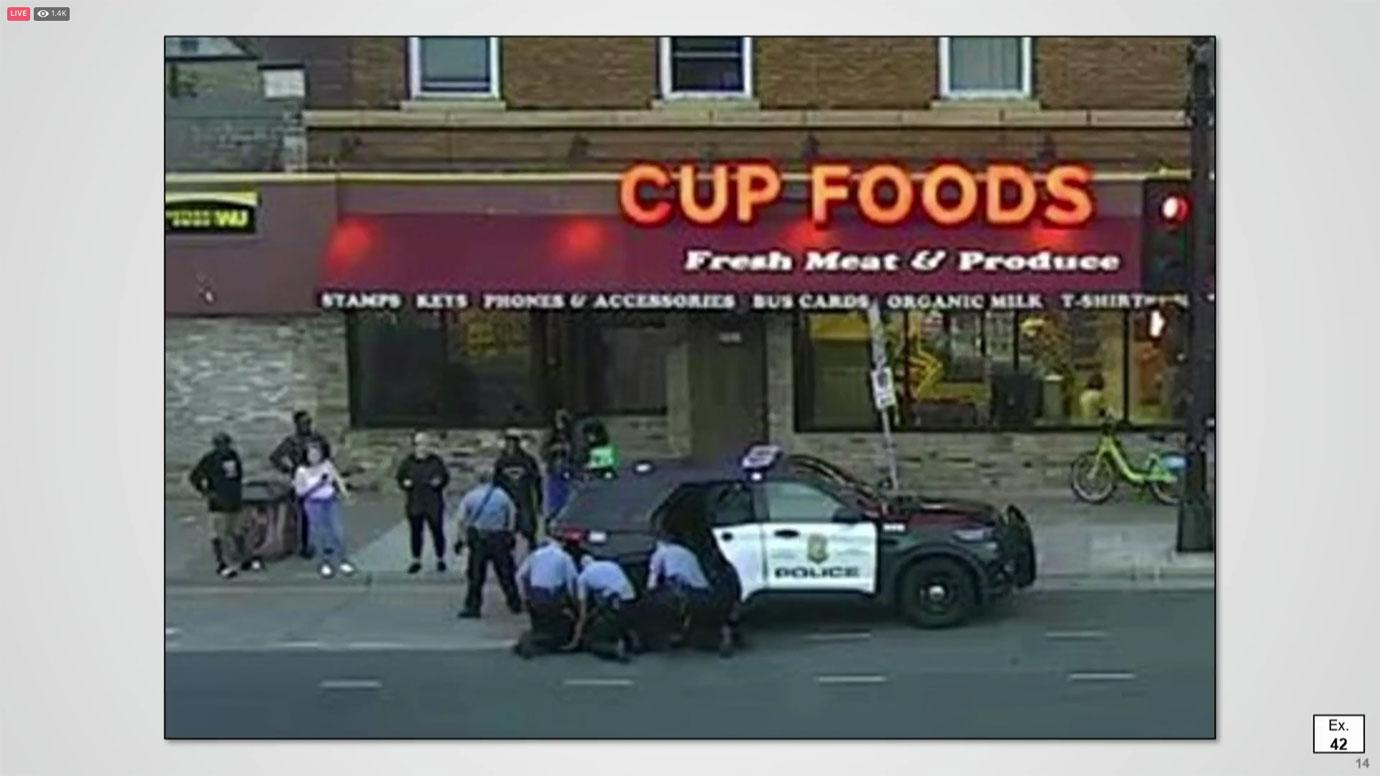
Officers hold George Floyd to the ground.
Floyd stopped responding when medical assistance arrived and was pronounced dead later at the hospital. The cause of death was ruled as a cardiopulmonary arrest, complicating law enforcement subdual, restraint and neck compression.
Prosecutors alleged Chauvin and the other officer used excessive force. The defense maintains it was a host of factors that led to Floyd’s death.
Throughout the trial, the prosecution presented 38 witnesses, while the defense called only seven witnesses.
STATE'S CLOSING
Prosecutor Steve Schleider started the state’s closing on a personal note by reminding the jury about Floyd’s special bond with his mother. Schleider stated how Floyd cuddled with her in a fetal position as a child and how he was surrounded by people he cared about throughout his life.
Next, the prosecution carefully took the jury on a step-by-step breakdown of how Floyd died, faced down on the pavement with Chauvin’s knee on his neck, and two other officer’s knees on his back and legs.
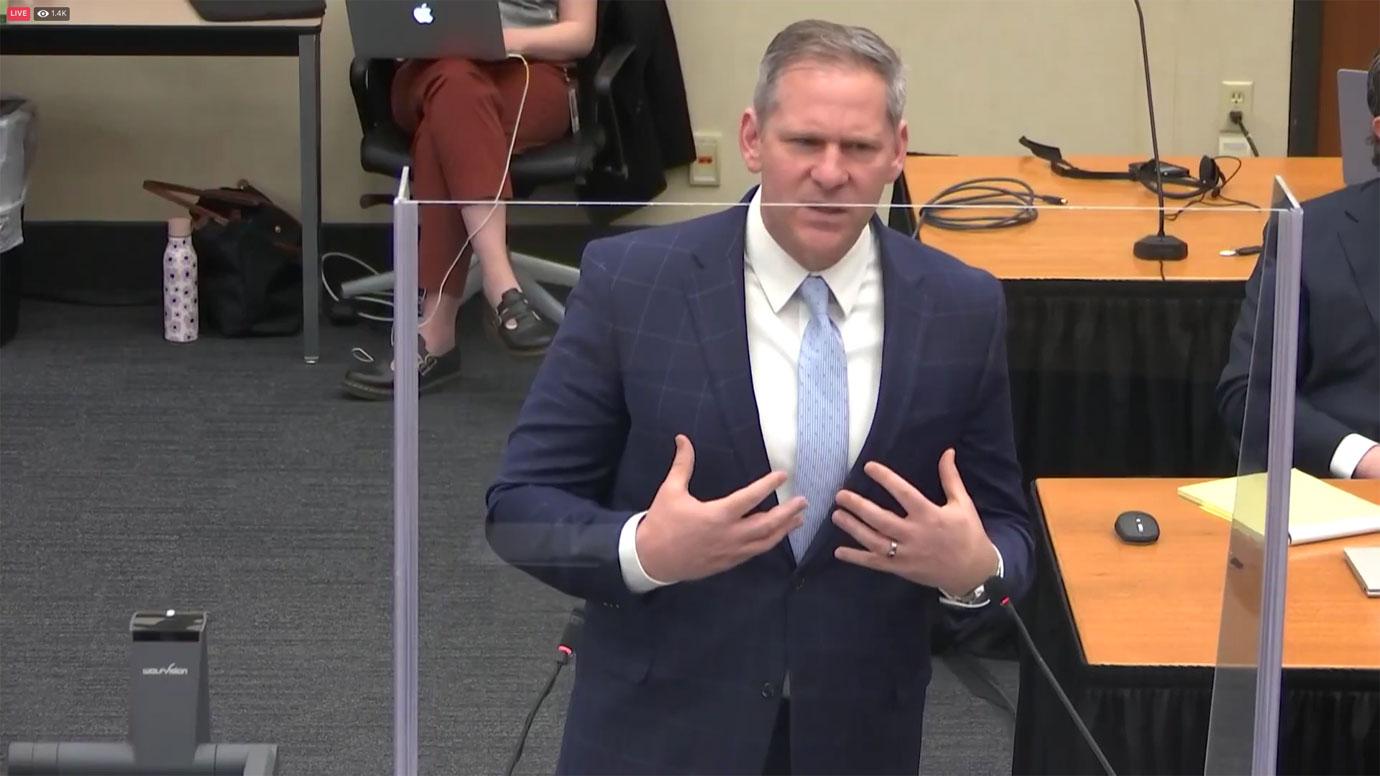
Steve Schleicher speaks during closing of the George Floyd trial.
As a result, Floyd struggled to breathe, tried to lift his face to give his lungs space to breathe, as he cried out for his mother.
Schleider reiterated to the jury that Floyd was not a threat to anyone. The only thing he needed was some compassion.
“The defendant needed to breathe. People need that. The defendant heard that but ignored him and continued the assault for 9 minutes and 29 seconds. Floyd was not breathing. The defendant had to know what was beneath him. You all saw the video," Schleider continued. "The paramedics had to tap the defendant to get up. By that time, his body was lifeless.”
In anticipation of the defense closing arguments, Schleider told the jury to dismiss the idea that Floyd was killed by either a drug overdose, carbon monoxide or a threat posed by bystanders as claimed by the defense during the trial.
“You’re not required to accept that the car did it, or accept the blame that it was the fault of bystanders,” said Schleider. “That’s not common sense, it’s nonsense.”
The prosecution ended its closing argument by telling the jury the acts committed by Chauvin cannot be classified as policing, but straight-up felony assault murder without excuse.
DEFENSE'S CLOSING
Attorney Eric Nelson began his lengthy closing statement by instructing the jury to review the entire evidence in the case. He highlighted the disparity between the videos shown by the prosecution as snippets with evidence in their favor — when in reality, they are part of longer video contents.
As an example, Nelson questioned the fact that Floyd’s death was determined by experts to be caused by asphyxia due to the low oxygen in his system.
“How could he be asphyxiated with 98 percent oxygen in his system at the hospital. It’s not intellectually honest. Compare the evidence against itself. I submit to you the state has failed to meet its burden beyond a reasonable doubt,” said Nelson.
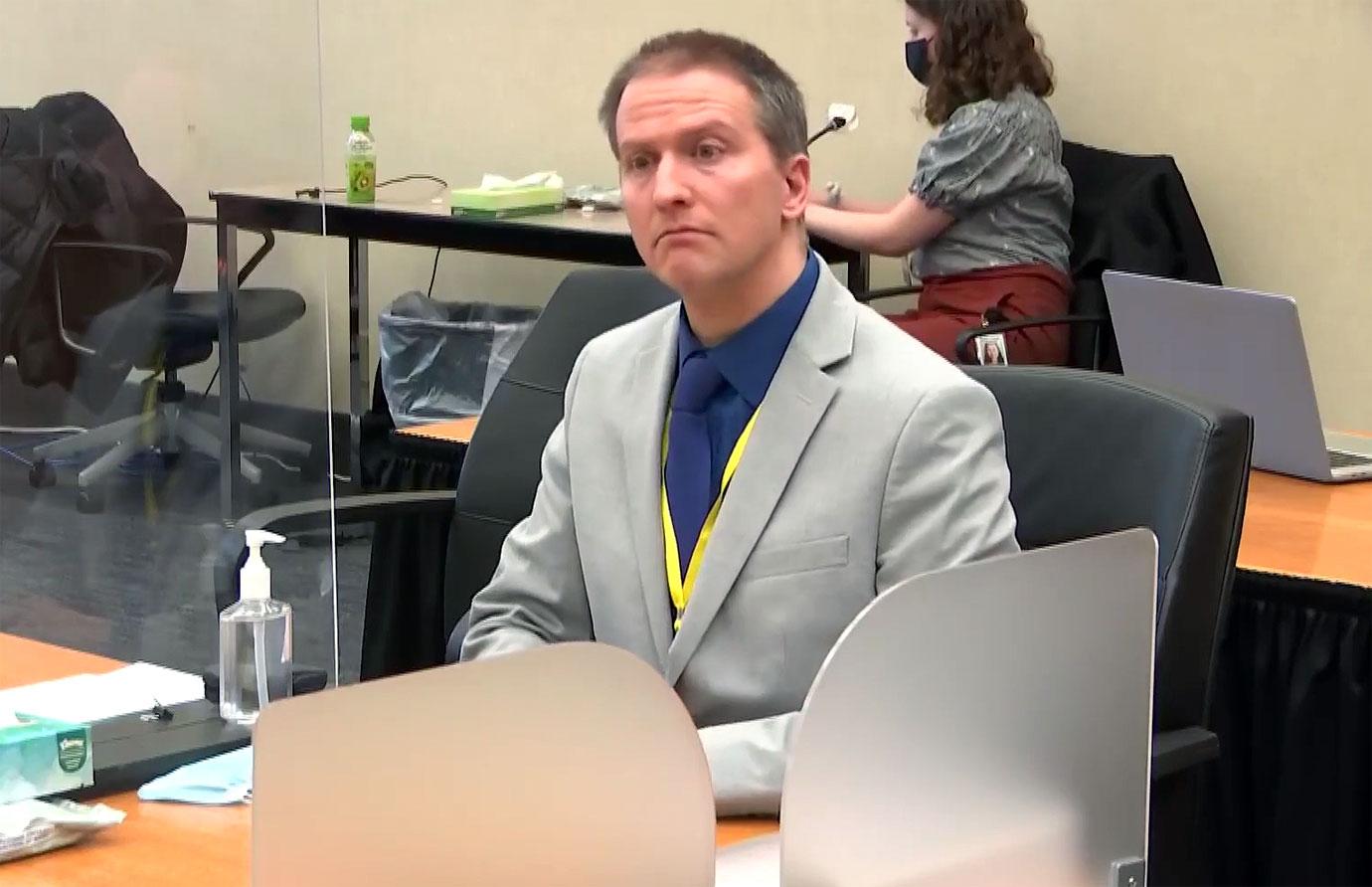
Derek Chauvin listens as closing statements are given during his trial.
The defense arrived at the statement from when paramedics had attempted to re-oxygenate Floyd by manually helping him to breathe on the way to the hospital.
Nelson then showed the jury the definition of the use-of-force, which needed the element of active aggression and active resistance, authorizing Chauvin’s decision to apply the knee on Floyd’s neck.
“Three Minneapolis officers could not get Floyd into the car. The use of force had been insufficient, said Nelson stating the rationale for the defendant being put in the prone position with his knee on Floyd’s neck.
The defense played a video at exactly 8:25 p.m. on May 25, 2020, showing the exact moment that Floyd took his last breath. Nelson attempted to convince the jury that Chauvin’s reaction at that moment was to pull his mace and shake it because the growing anxiety of bystanders threatened him.
“All of these facts changed Chauvin perception,” he stated.
Nelson called the suggestion that all the different factors didn't play a part as "preposterous."
"Mr. Floyd's death needs to be looked at as Dr. Baker described a multifactorial process," Nelson said.
Nelson asserted that no crime was committed if Chauvin employed an authorized use of force. He also reminded the panel that officers are also human beings, and the reasonableness of the use of force is a very hard thing to do.
JURY DELIBERATES
From the first day of trial to the closing statements, the jurors paid close attention, often taking detailed notes during testimonies.
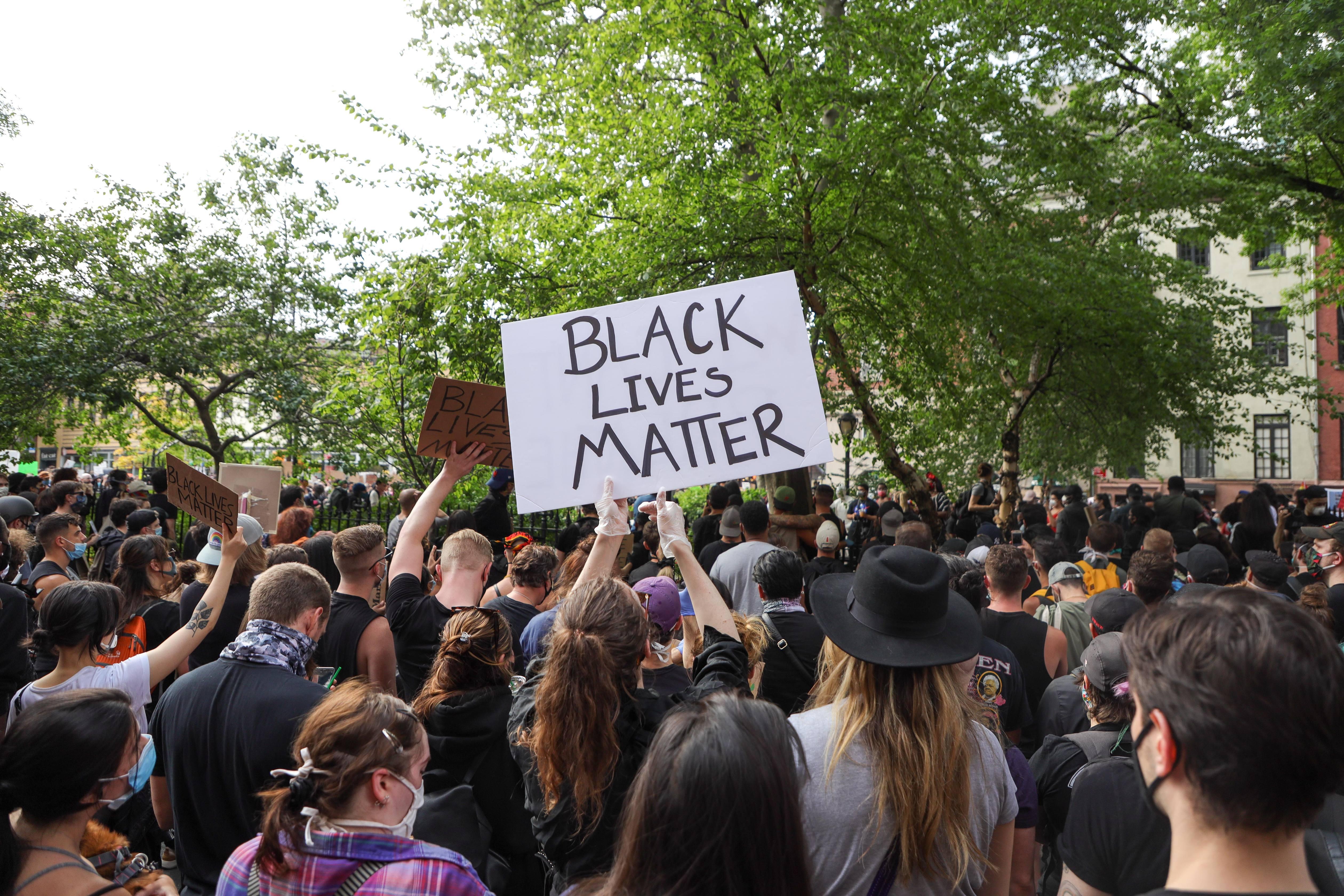
A protest after George Floyd's death
Before closing arguments, Judge Peter Cahill of the Hennepin County District Court read the instructions to the jury about the rules of the law as it applies to the trial. Furthermore, he ordered the jurors to be sequestered for deliberations. Cahill warned the jurors to be ready for a long haul if necessary and hope for a short time to return its verdict.
After the sides gave their closing arguments, Nelson again brought up the media coverage of the case and the fact the jury was not sequestered. At play was the comments by Rep. Maxine Waters (D-Calif.) who encouraged protests during the trial.
Cahill said she may have committed an appealable offense with her comments.
"I just don't know how this jury can really be. That they are free from the taint of this,” Nelson said.. “Now that we U.S. representatives threatening acts of in relation to this specific case. It’s mind-boggling.”
But, everytime the issue the issue of sequestrian came up during the trial, Cahill rejected it and continued to say the jury would be allowed to return home until it started its deliberations.
The city of Minneapolis is already on edge for fear of riots, with most of the city boarded-up, barriers erected, and 3,000 National Guard troops called in to assist local law enforcement. On April 18, two members of the National Guards sustained minor injuries after a drive-by shooting, indicating an escalation of the threat level.
If Chauvin is convicted, the second-degree murder carries a maximum of 40 years in prison, while the third-degree murder charge carries a maximum of 25 years. In addition, a conviction of second-degree manslaughter allows a maximum sentence of 10 years in prison and/ or a $20,000 fine.
The country now must await the decision at the hands of twelve jurors. What happens next is anyone’s guess.
Become a Front Page Detective
Sign up to receive breaking
Front Page Detectives
news and exclusive investigations.
